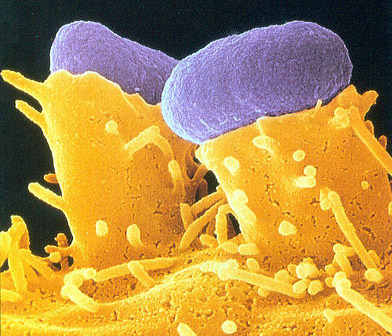Science by
the Numbers
or
how long might it have taken for life to spread
around the globe?
The first cell was a very small microscopic
organism,
and it took millions of years for it to evolve,
but how long might it have taken to spread around the globe once
evolved?
Let's start small.
How long would it take to fill up an
Olympic swimming pool with
reproducing bacteria?
To answer this we must estimate the volume of an
ordinary prokaryotic bacterium and
compare it to the volume of an
Olympic pool.
|
a typical bacterium is about 1.0
ϥm
across, so its volume would be about: (1.0 ϥm)3 = 1 x 10-21 cubic meters |
an Olympic pool such as the National Aquatic Center for the Beijing Games must be: 7,500 cubic meters |
 |
 |
The question boils down to how many times would you have to double a 1 x 10-21 cubic meter bacteria to fill a 7,500 cubic meter space. If we divide the pool volume by the tiny volume of a bacterium ( 1 x 10-21 cubic meters/7,500 cubic meters) = we need 7.5x1024 bacteria.
How long would it take to produce 7.5x1024 bacterium. Beginning on the first day and assuming a replication rate on 1 division per day, then there would be 2 on second day, and 4 on the third day, and 8 on the fourth day, and so on. After three weeks we would have more than one million bacteria. Day by day, the numbers would increase geometrically. After 2 months we would have some 1018 bacteria and by about 3 months we would have 1027 bacteria, more than enough to fill our Olympic pool.
Let's be more ambitious. Let's fill the Mediterranean. A recent world atlas gave the surface area of the Mediterranean Sea as about 2.5 million square kilometers, with an average depth of 1.4 km, for a total volume of 3,500 x 106 cubic km or 3.5 x 109 cubic meters. We would need 3.5 x 1030 bacteria to fill the Mediterranean. In just 10 more days beyond what it would take to fill our Olympic pool we would be able to completely fill the Mediterranean. In only 100 days after the first divided we filled the Med. Wow!.
Obviously no body of water would be completely filled with bacteria; there would need to be some environmental space among the bacteria for habitat adaptation and locomotion. It is also likely that the first cells did not spread quite as fast, nor was their division as regular and predictable. But the implication for the early spread of life is clear. While it may have taken hundreds of millions of years for the first cell to evolve, a large number of its descendents could have spread throughout the world's oceans relatively quickly.
end